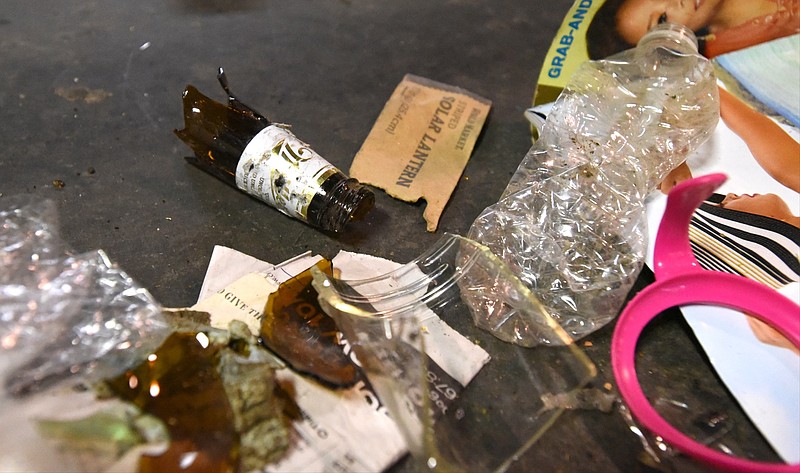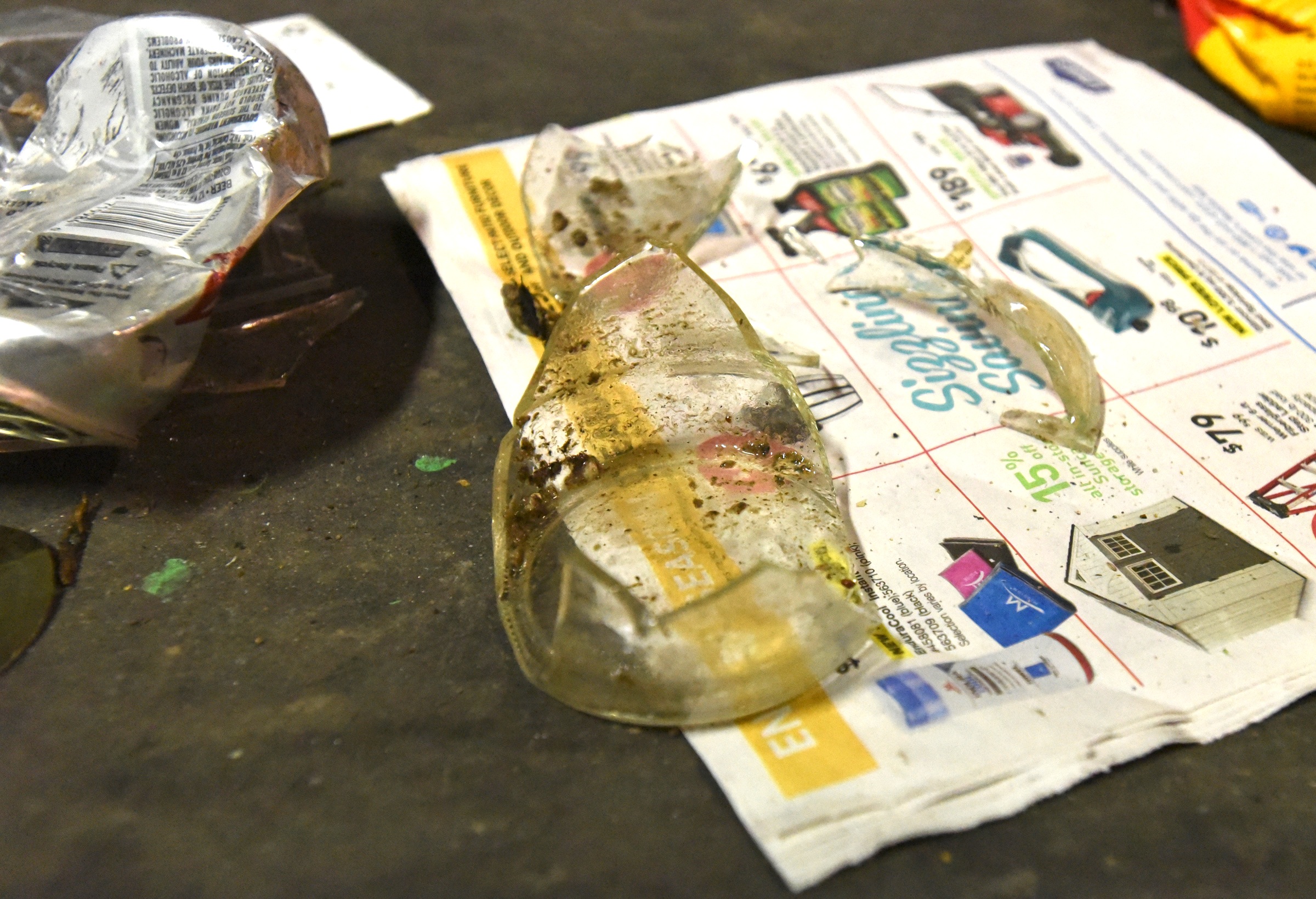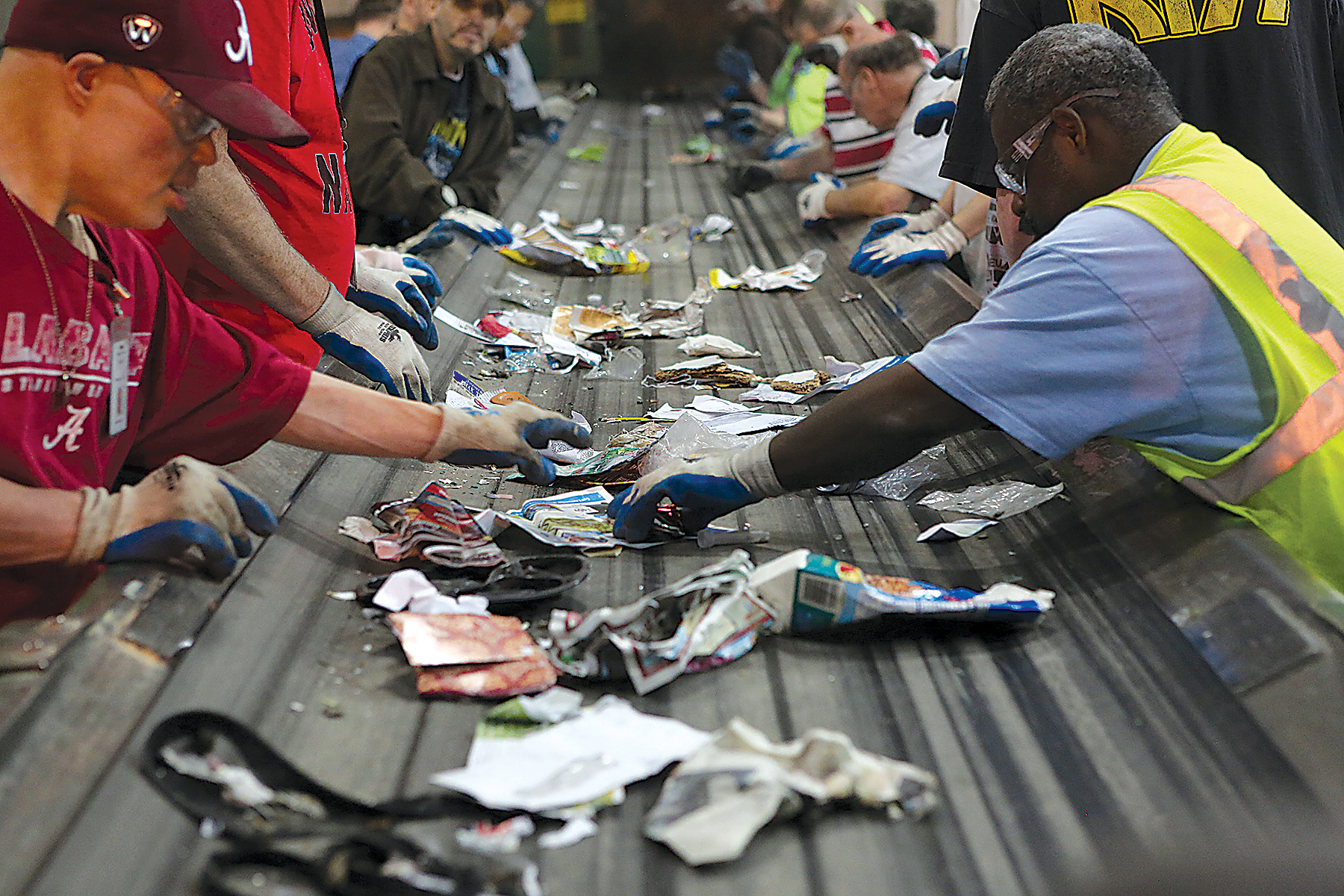Recycle right
Want to make sure your glass is getting recycled? For the time being, don’t mix it with other recyclables in a single-stream container in Chattanooga, East Ridge or Signal Mountain. Instead, sort glass and drop it off at a Hamilton County or city recycling center. Orange Grove Center stores this pre-sorted glass in “bunkers” at its Derby Street campus and sells it for $9 a ton to Strategic Materials in Atlanta.
Since September, the city of Chattanooga has let residents recycle empty glass bottles and jars at the curb.
But the glass that Chattanoogans toss into their new, 96-gallon curbside containers winds up in the landfill. That's because Orange Grove Center, the nonprofit organization for people with disabilities that has the contract to sort the city's recyclables, isn't equipped to remove broken glass from the curbside containers' mix of paper, cardboard, plastic bottles, plastic bags and metal cans.
Glass is also landfill-bound from two other area cities that offer "single-stream" recycling, which is becoming the norm nationally because it's more convenient for residents to put everything into one container than to sort their recyclables.
Glass goes to the landfill from East Ridge, where residents do single-stream recycling in curbside bins, and from Signal Mountain, where residents drop off their single-stream recyclables at the recycling center near City Hall on Taft Highway. Both cities have their single-stream recyclables processed at a materials recovery facility off South Market Street near The Howard School that's owned by WestRock, formerly RockTenn.
WestRock has machinery that sorts the glass out of the mix of recyclables, but can't sell it profitably, said Mike Fitzgerald, with WestRock. So the crushed glass gets spread as landfill cover, he said.
"We're having a tough time getting rid of it," Fitzgerald said, adding, "I would definitely prefer that glass is not in single-stream [containers]."
When Signal Mountain launched single-stream recycling in 2011, the WestRock facility did recycle glass, said Loretta Hopper, the city's director of public works.
"[WestRock has] been saying they may not be able to take it much longer," Hopper said Thursday. "We won't be able to take glass, if they can't take it."
Chattanooga Public Works Director Lee Norris wasn't aware that glass put into the city's blue curbside containers isn't being recycled after delivery to Orange Grove.
"I can't say yea or nay on that one," Norris said Monday. "All we do is deliver it to them; they take care of it from there."
Jagged, broken glass
Glass breaks when the mix of single-stream recyclables is compacted in garbage trucks and smashed by the wheels of heavy equipment on the receiving floor, or "tipping floor," at materials recycling facilities.
At Orange Grove, this jagged, broken glass travels along the facility's conveyor belts past the sorting stations manned by workers with developmental disabilities. For their safety, the workers do their best to avoid touching the broken - and unbroken - beer, wine and liquor bottles and glass jars. So the glass goes to the end of the line and falls into a metal container destined for the landfill.
Still, the influx of glass from single-stream curbside containers has caused an "uptick" in injuries at the center, said Heidi Hoffecker, the center's director of development, including at residents' homes when glass shards get stuck to the soles of workers' shoes.
"We still are able to recycle 80 to 90 percent of the glass that comes into Orange Grove," Hoffecker said.
That's because most of the glass delivered to Orange Grove is pre-sorted - by residents who drop it off at county and city recycling stations, and by restaurants and bars whose employees sort glass for Orange Grove's Recycle Express for Business program. Orange Grove stores this glass at "bunkers" at its Derby Street campus and sells it, Hoffecker said, for between $6 and $32 a ton to Strategic Materials in Atlanta, depending on the color of the glass and market price.
But glass that Chattanooga residents put into the city's blue, single-stream curbside bins doesn't get recycled.
It might be some consolation for recycling advocates to know that, apparently, not every Chattanoogan has heard about curbside recycling for glass.
"Lots of residents are still not putting glass in the blue bins," Hoffecker said.
There's been anger elsewhere - including in Rhode Island and Regina, Saskatchewan, Canada - when residents learned that glass they put in single-stream recycling bins wound up in landfills, said Susan Collins, president of the Container Recycling Institute, a nonprofit organization in Culver City, Calif., that promotes recycling.
"Residents are typically very disappointed to find out," Collins said. "They are dutifully sorting, rinsing and taking care of their [glass]."
$1.6 million fix?
Orange Grove is trying to raise $1.6 million for new equipment designed to let the glass, which is heavier than other materials, fall out of the mix.
The center can start installing the equipment once it's gotten commitments for $1 million in donations, Hoffecker said. So far, the center has gotten pledges for $770,000, including $250,000 from the city of Chattanooga, $250,000 from the Lyndhurst Foundation and the remainder from two other foundations that declined to be identified. The Hamilton County Commission turned down Orange Grove's request for $250,000.
"This is the most significant upgrade to our facility in 27 years," Hoffecker said.
Even if Orange Grove didn't need to sort glass from single-stream recyclables, it would need to upgrade its recycling equipment, Hoffecker said, because the volume has almost doubled.
Curbside recycling has skyrocketed in Chattanooga since September. City figures showed 22,423 Chattanoogans participating in June, up from 17,634 in September. Collections climbed to 417 tons in June, up from 222 tons in September.
"The city's stated goal was to increase household participation to 26,000 households, and we're already almost there in less than a year," Hoffecker said. "So we would have needed to do upgrades, regardless, to handle that kind of increased volume."
In addition to glass-sorting machinery, the new equipment will include a "bag ripper" to open bagged recyclables, magnets to help sort metals and another mechanism that will suck plastic grocery bags out of the mix.
Orange Grove isn't in the recycling business to make money, Hoffecker said.
"Our primary goal has been to provide meaningful work opportunities for people with significant disabilities," she said.
Hoffecker declined to say whether it was premature to tell residents they could put glass into Chattanooga's curbside recycling containers before Orange Grove installed equipment to better sort it.
"We've been partners with the city since 1992," she said. "They make a decision, and we will take care of what needs to happen, in order to continue to provide jobs for people who might otherwise have difficulty finding employment."
Contact staff writer Tim Omarzu at tomarzu@timesfreepress.com or www.facebook.com/tim.omarzu or twitter.com/TimOmarzu or 423-757-6651.


